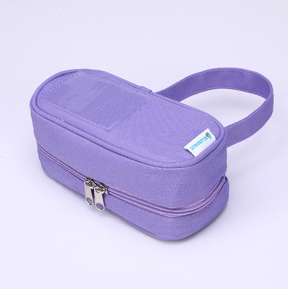|
How often do you see other patients and parents carrying their allergy medication in supermarket plastic bags, plastic boxes, the bottom of rucksacks or stuffed into handbags?
Considering millions of adrenaline auto-injectors are circulating worldwide, with an estimate of roughly one million in circulation, solely in the United Kingdom, the need for more education on allergy management is clear. Prescription allergy medication needs to be stored safely, in order to ensure its effectiveness. It’s clear that awareness is key when it comes to safely transporting allergy medication, and the best solution is continued and sustained training and information provided by healthcare professionals to carriers of allergy medication. So, are there really specific storage conditions and, if so, how do we know what they are? Let’s go back in time and try to understand adrenaline auto-injectors - the main medication needed in case of anaphylaxis. Although it’s now widely known that adrenaline is produced in the supra-renal glands of the human body, this was only found by a Japanese immigrant to the United States (Jokichi Takamine) in 1901. Before that, many studies had been done to understand why dogs who had their glands removed would eventually die. The research into what these glands were for started in the 16th century when they were discovered. Since Jokichi Takamine named the substance produced in them “adrenaline”, more research has been done to understand how it works and what led to it being more stable or degrading. Interestingly, it’s only since the late 20th century that we’ve had proper research showing the degradation of adrenaline when exposed to either sunlight or high temperatures. This research was focused on GPs carrying adrenaline in their bags in Pert, Western Australia. The evidence they had is that a Doctor’s black bag could reach temperatures as high as 80°C. So, let’s look at what the evidence has shown so far:
Understanding what the evidence shows is easy, but how should you weave this into your everyday life? The best and easiest way to do so is by carrying their medication in an insulated bag specifically designed to place it inside. Along with this, there are a few more steps needed to be taken, although they are relatively easy ones. Let’s make a short list of the “dos” and “don’ts” to keep your medication safe: DO:
DON’T:
If you follow those tips, you or your child can relax knowing that your medication is stored optimally. Comments are closed.
|
AuthorAneta Ivanova Archives
March 2023
Categories |
The Consulting Rooms, 38 Harborne Road, Birmingham, B15 3EB
[email protected]
Website design & content by LIT Communication: www.litcommunication.com
[email protected]
Website design & content by LIT Communication: www.litcommunication.com


 RSS Feed
RSS Feed